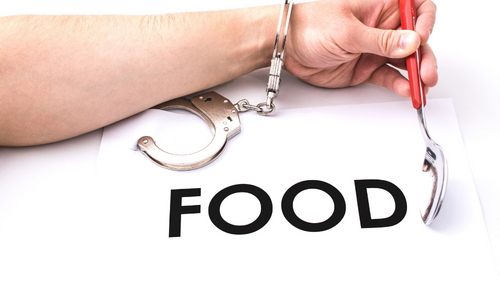20 Ways That Processed Food Resembles Recreational Drugs?

Issue No. 31 | Brought to you by the Addiction Reset Community – ARC
Unlocking the secrets of processed food addiction and guiding you to find freedom from food and weight obsession.

Many people who struggle with overeating or fail to cut back on processed foods despite their best efforts, still believe that this is due to their lack of willpower. They live with shame and self-judgement, believing that they are simply “not trying hard enough”.

Big Food and dieting industries have thrived on the vicious weight-gain-weight-loss-cycle that many find themselves caught in.
Awareness, diagnosis and management of processed food addiction is still relatively low, with medical professionals, health coaches and society at large, still not acknowledging processed food addiction as a “real addiction”.
In the years spent by Dr Joan Ifland (PhD) while researching as the lead author and editor of the textbook Processed Food Addiction: Foundations, Assessment and Management, she reviewed more than 6000 scientific studies. This extensive research uncovered at least 20 ways in which processed food addiction resembles addiction to recreational drugs:
- Similar neuro-functioning in both drug users and overeaters, including downregulated reward pathways and sensitized stress pathways.
- There is continued use despite knowing the harm of both drug use and eating processed foods.
- Cognitive impairment results from both addictions.
- Cue reactivity is present in both drug addiction and processed food addiction.
- Users experience failed attempts to cut back on both drug use and processed food addiction.
- Denial and hiding the problem is prevalent in both drug use and PFA.
- Patterns of use can be inherited in both addictions.
- Genetics and epigenetics play a role in both drug and processed food addiction.
- Both addictions come with a large cost to society, for example, the burden on the healthcare system.
- Cravings and obsessive thoughts are prevalent in both addictions.
- Both addictions are correlated with adverse childhood experiences, e.g. emotional abuse.
- Abstinence plays a large role in the treatment of both drug addiction and processed food addiction.
- Abstinence from both drug use and processed food use leads to withdrawal symptoms.
- Both addictions are aggravated through ‘Pavlovian’ conditioning, repeated cues and continued use to heighten reward sensitivity and cravings.
- Both drug addiction and processed food addiction are more likely to occur amongst under-educated and lower-income communities.
- Manipulative business practices are used by both drug and processed food industries to drive use.
- The cravings and overuse of both drugs and processed foods may lead to the deterioration of employment, relationships and activities.
- That both drug addiction and processed food addiction result in a large number of comorbidities including, physical and mental illnesses as well as social impairment.
- Babies of mothers who abuse drugs, alcohol or processed food during pregnancy, can all suffer from congenital defects.
- Both drug and processed food addictions conform to the 11 DSM-5 (Diagnostic and Statistical Manual SUD (Substance Use Diagnostic) criteria for addiction.


Within the Addiction Reset Community (ARC) our members and their journeys are important to us. We find their stories inspiring and hopeful for everybody in health recovery.
“At the age of 44, I felt I was done. There was no hope. I was so close to giving up completely, just letting my addiction take me over. I could fight no more. I was isolated and ready to check out. I was DONE. Then I discovered Dr Ifland and I joined the ARC. Slowly but surely, with the odd slip, I can see the light. I know I have the secret now and no one can take that away from me. I have hope again.”

Many people reach out to Joan asking for advice and assistance on how they can begin their recovery journey.
Dear Joan
I have heard you speak at various conferences and podcasts and I am always intrigued when you say that food addiction is “not your fault”. If I am making the choice to put the food in my mouth, how is that not my fault?
Joan responds:
Overeating is not your fault because initially, no one realized that when the big tobacco industry took over the processed food industry, it brought along a very effective addiction business model. The same addiction business model had brought smoking cigarettes to about two-thirds of American adults. Now we see the net effect of that same model causing overeating and obesity in about two-thirds of the American population as well. The devastating effects on health can be found throughout the world. When someone is in the throes of active processed food addiction, their “choices” are being driven by the addiction. This is not a matter of poor judgment. It takes intensive brain retraining to put the addiction into remission in order to regain control of food choices.
DISCLAIMER:
Dr Joan Ifland (PhD) is a global expert on the subject of processed food addiction and is not a medical doctor. Information and response shared in this Newsletter are not intended for, and should not be construed as medical advice.

Do you have a question? Reach out to us with your questions about food addiction and recovery at gethelp@foodaddictionreset.com
Are you showing signs of Processed Food Addiction? Take this self-quiz to find out now!
Recent copies of Dr Joan Ifland's Blog:
Issue 01 | Issue 02 | Issue 03 | Issue 04 | Issue 05 | Issue 06 | Issue 07 | Issue 08 | Issue 09 | Issue 10 | Issue 11 | Issue 12 | Issue 13 | Issue 14 | Issue 15 | Issue 16 | Issue 17 | Issue 18 | Issue 19 | Issue 20 | Issue 21 | Issue 22 | Issue 23 | Issue 24 | Issue 25 | Issue 26 | Issue 27 | Issue 28 | Issue 29 | Issue 30

